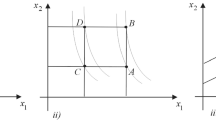Abstract
It is shown that assumptions about risk aversion, usually studied under the pre-supposition of expected utility maximization, have a surprising extra merit at an earlier stage of the measurement work: together with the sure-thing principle, these assumptions imply subjective expected utility maximization for monotonic continuous weak orders.
Similar content being viewed by others
References
E.W. Adams, R.F. Fagot and R. Robinson, On the empirical status of axioms in theories of fundamental measurement, Journal of Mathematical Psychology 7(1970)379.
G. Debreu, Topological methods in cardinal utility theory, in:Mathematical Methods in the Social Sciences, ed. K.J. Arrow, S. Karlin and P. Suppes (Stanford University Press, Stanford, 1960) pp. 16–26.
G. Debreu and T.C. Koopmans, Additively decomposed quasi-convex functions, Math. Progr. 24(1982)1.
W. Eichhorn,Functional Equations in Economics (Addison-Wesley, Reading, MA, 1978).
D.H. Krantz, R.D. Luce, P. Suppes and A. Tversky,Foundations of Measurement, Vol. I (Academic Press, New York, 1971).
J.W. Pratt, Risk aversion in the small and in the large, Econometrica 32(1964)122.
L.J. Savage,The Foundations of Statistics (Wiley, New York, 1954), 2nd ed: 1972.
F. Stehling, Eine neue Charakterisierung der CD- und ACMS-Produktionsfunktionen, Operations Research-Verfahren 21(1975)222.
P.P. Wakker, Cardinal coordinate independence for expected utility, Journal of Mathematical Psychology 28(1984)110.
P.P. Wakker, Continuous expected utility for arbitrary state spaces, Methods of Operations Research 50(1984)113.
P.P. Wakker, Concave additively decomposable representing functions and risk aversion, in:Recent Developments in the Foundations of Utility and Risk Theory, ed. L. Daboni, A. Montesano and M. Lines (Reidel, Dordrecht, 1986) pp. 249–262.
P.P. Wakker, H.J.M. Peters and T.B.P.L. van Riel, Comparisons of risk aversion, with an application to bargaining, Methods of Operations Research 54(1986)307.
Author information
Authors and Affiliations
Additional information
This study was carried out while the author was at the Netherlands Central Bureau of Statistics, Department of Statistical Methods, Voorburg, The Netherlands.
Rights and permissions
About this article
Cite this article
Wakker, P.P. Subjective expected utility with nonincreasing risk aversion. Ann Oper Res 19, 219–228 (1989). https://doi.org/10.1007/BF02283522
Issue Date:
DOI: https://doi.org/10.1007/BF02283522




